
I thought I wouldn't live through it. But you do. You learn to love the place somebody leaves behind for you.
In "Prodigal Summer" by Barbara Kingsolver, the quote reflects the deep emotional resilience of individuals facing loss. It expresses the sentiment that, despite the overwhelming pain and feelings of despair that accompany losing someone, one is eventually able to find strength and acceptance. The journey through grief transforms one's perspective, allowing them to appreciate the memories and love attached to the person who has passed away.
This idea emphasizes the process of healing and the possibility of growth after tragedy. As time progresses, the scars of loss become a part of one's story, leading to a newfound appreciation for both the past and the connection to the departed. Ultimately, it conveys a powerful message of survival and the enduring nature of love, suggesting that even in sorrow, beauty and hope can emerge.











